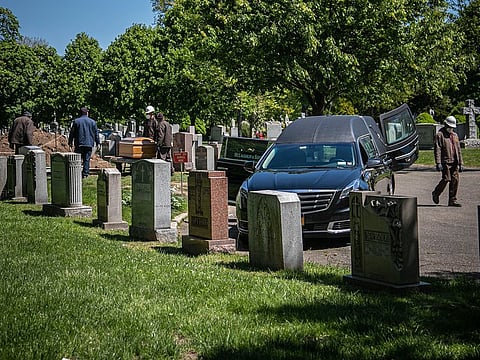Coronavirus: Leaving alone the dead
None of them were able to make their last journey from their homes

The dreaded coronavirus has left the whole world in quarantine mode. It has not just disconnected us at the individual level, but at times even from the families. It has broken the networks between the countries and continents while completely transforming the way we live our each day, every minute. It has induced an incessant fear and anxiety in our lives. The pandemic has raised unanswered questions about our future, about how our lives would look tomorrow and later.
Besides the innumerable number of ways in which the coronavirus has changed the lives of living, it has not spared injustice even to the dead.
It left the dead as much alone as the living. The way the deaths (caused by the virus or otherwise) and funerals have been handled has been unusual in history.
As the virus spreads infecting millions across the globe, it has killed over 300,000 people. But those who lost their lives did not face a usual death from any sickness. The Covid-19 patients struggled alone within the walls of the hospitals, surrounded by many others like them who died in front of their eyes or fought death every day. The only people they would get to meet or talk to would be doctors and paramedical staff. Rarely a family member would pay a hurried visit and say goodbye without hugging or holding hands. They had no one to console, no one to make them smile, and none to give them courage to come back to life except for the medical staff. They fought the pain, the fear alone. When they took their last breath, there was no one to say a prayer and hold their hands to tell them how much they were loved and cared for. They died without saying last words to their families, without making or giving any promises to their dear ones. They faced death not only with the fear for themselves, but also for their families. They died embracing guilt of having put the lives of their dearest people in danger.
Even after their death, their families could not sit by their side to cry. They were rushed out of the hospital as if handling a time bomb. The wails and cries suppressed by anxiousness and worry over spreading of virus by even their dead body which was no more functioning.
None of them were able to make their last journey from their homes where they had spent their lives, lived their best times and celebrated their success. Where they brought up their children and played with their grandchildren. They could not bid farewell to their childhood friends, their relatives, colleagues with whom they shared jokes during break time at work. They could not hug their beloved family, not a kiss they could exchange. They were denied the right of ritual bath and other rites that follows a death. There were no conversations about the dead in funeral gatherings. The dead were rushed for the burial with even the family missing who cried within the walls of the isolation centers or homes. Sometimes a son was buried without his father at his side and other times, a man’s grave was dug by the son himself.
The few people who supervised the burials or funerals had no one to console. As they buried the dead in the grave, and layered it with earth, no one waited to cry over the grave, no one put flowers on them. Weeks and even months after their death, their graves are silent, deserted with no visitor.
They were left alone, as their families fought the fear of coronavirus infection. The graveyards are as isolated the living world itself.
Days, months and weeks past this coronavirus breakout, the lives of humans, who survive, will slowly but surely trail back. But what can’t be brought back are the lives lost and the pain of the families of the deceased who were denied the right to mourn their dead, and sit by their graves to cry. They would not only be remembered for being the victims of the deadliest pandemic in human history, but also the ones whose rights were denied even as dead.
— Sana Altaf is a Dubai based freelance writer


